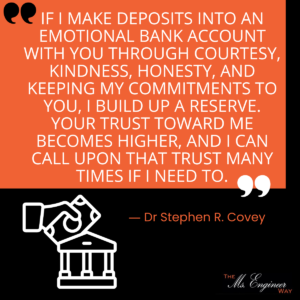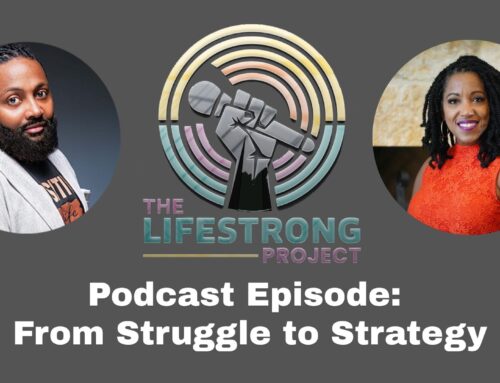High performing teams are at the heart of organizational success. Creating and maintaining a high performing team is still elusive for many managers and leaders, in part because organizations often award promotions based on technical skills and tenure and leave the team building to chance.
It doesn’t have to be this way. Team building is a skill that can be learned and practiced. When done well, it will produce results. We are capable of so much more together than individually, but it takes a high level of trust to consistently perform at our best.
For this article on building trust in teams, I want to draw on and acknowledge Dr Stephen R Covey’s Emotional Bank Account theory — it’s a powerful tool for trust in relationships that I use regularly in my own work. Dr Covey described how everything we say and everything we do makes an impact — either positive or negative — on someone else and that results in either a deposit to or withdrawal from your Emotional Bank Account with that person.
Trust forms the foundation upon which strong relationships, open communication, and collaborative efforts are built. When trust is present, team members feel safe, valued, and empowered to take risks, share ideas, and collaborate effectively. On the other hand, a lack of trust leads to disengagement, poor communication, and decreased productivity. It is crucial for leaders and managers to actively cultivate an environment where trust can thrive, allowing teams to reach their full potential.

Check your trust balance with Dr Covey’s Emotional Bank Account
The Emotional Bank Account (EBA) represents the metaphorical balance of trust in a relationship, be it personal or professional. It is based on the idea that trust is built or eroded through a series of deposits and withdrawals, similar to a financial bank account.
Deposits in the Emotional Bank Account are acts of kindness, respect, understanding, and genuine care. These deposits build trust and create a reservoir of goodwill within teams. Examples of deposits include actively listening to team members, acknowledging their contributions, providing constructive feedback, and demonstrating consistency and reliability.
Withdrawals, on the other hand, are detrimental actions that deplete trust. Withdrawals can include broken promises, lack of accountability, microaggressions and disrespect, dishonesty, and failing to deliver on commitments. Each withdrawal weakens the trust within a team and can have long-lasting effects on relationships and team dynamics.
Strategies for Building Trust using the Emotional Bank Account:
- Lead by Example: As a leader, it is essential to model trustworthy behavior. Demonstrate integrity, transparency, and honesty in all your actions and communications. Actively engage in building relationships with your team members, listen attentively, and show genuine care and empathy.
- Clear Communication: Ensure that communication channels are open, transparent, and inclusive. Encourage open dialogue, active listening, and provide timely and constructive feedback.
- Accountability and Reliability: Follow through on commitments and hold yourself and your team members accountable for their actions and responsibilities. Consistently deliver on promises and meet deadlines.
- Encourage Collaboration: Foster a collaborative environment where diverse perspectives are valued and respected. Encourage teamwork, brainstorming sessions, and the sharing of ideas.
- Recognition and Appreciation: Regularly acknowledge and celebrate team members’ achievements and milestones. Recognize their efforts, both individually and collectively. Small gestures of appreciation go a long way in building trust and boosting team morale.
- Conflict Resolution: Address conflicts promptly and constructively. Encourage open and respectful dialogue to resolve conflicts and find mutually beneficial solutions. Create a safe space where team members feel comfortable expressing their concerns and working towards a resolution.
Don’t fall into the transaction trap
While the EBA approach can be a valuable tool for building trust, it’s important to acknowledge that it is not without its limitations. There are a few potential challenges that it pays to be aware of when you embark on your trust building journey:
- The EBA approach can sometimes create a transactional mindset within teams. If team members become too focused on deposits and withdrawals, they may approach trust-building as a tit-for-tat exchange rather than a genuine and authentic relationship. This can undermine the sincerity and depth of trust within the team. Showing empathy and vulnerability are essential elements of trust.
- Trust is not just about individual actions so don’t forget to consider factors such as the culture, processes and leadership styles in your organization that might influence how you build trust collectively.
- It takes time and patience to build trust. The EBA is a great actions-based approach but don’t expect immediate results — remember, you are gradually building up that bank balance.
- Try not to focus on your deposits and withdrawals to the detriment of the nuances of trust including forgiveness. The quote by Alexander Pope: “To err is human, to forgive divine” is a great reminder that making mistakes is a very human experience and it’s how we respond to them that matters.
Building trust within teams is a continuous journey that requires effort, intention, and consistent practice. By applying Stephen Covey’s theory of the Emotional Bank Account as part of a holistic approach, leaders and managers can create an environment where trust flourishes and potential is reached. Are you ready to start making some deposits?






